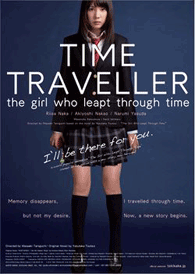
To make it easy for everyone, the only constant thing in this franchise is that a girl will gain the power to travel through time via a science laboratory accident, gain an insight about the human condition that will assist in her coming of age, and may be presented with a chance to change or avert history.
In 2010, Akari, the girl who leaps (Riisa Naka) is the daughter of the ‘original’ girl who leapt in 1972. Anyway, through a laboured plot contrivance, the daughter is sent back in time on a rendezvous on behalf of her single mother and hilarity ensues when she gets the date wrong and is stuck in the 1970s, slumming it out with a motley crew of sci-fi geeks who are enthusiastic but horrendously bad filmmakers. One of them – but which one? – is her future father, who will one day be a genius director!
This particular entry in the franchise isn’t that fixated on the science fiction aspect or even potential temporal paradoxes. Masaaki Taniguchi is very much interested in the filmmaking as memory and thwarted desire, and happily uses the sci-fi film crew’s production to expound on these themes – which incidentally provide commentary and illumination on Akari’s unhappy condition.
Compared to say the 2006 edition of the girl who leapt through time, Time Traveller suffers from a much smaller budget and a newbie director – special effects look raw, the plot isn’t all that tight, and the film works much better when it is furthest away from sci-fi territory. This may be the least comedic entry in the franchise and possibly the one with the most downbeat ending, but it tries to be the most poetic of them all.












 列印版本
列印版本










讀者回應
搶先發表第一個回應吧!
請先登入再使用此功能。